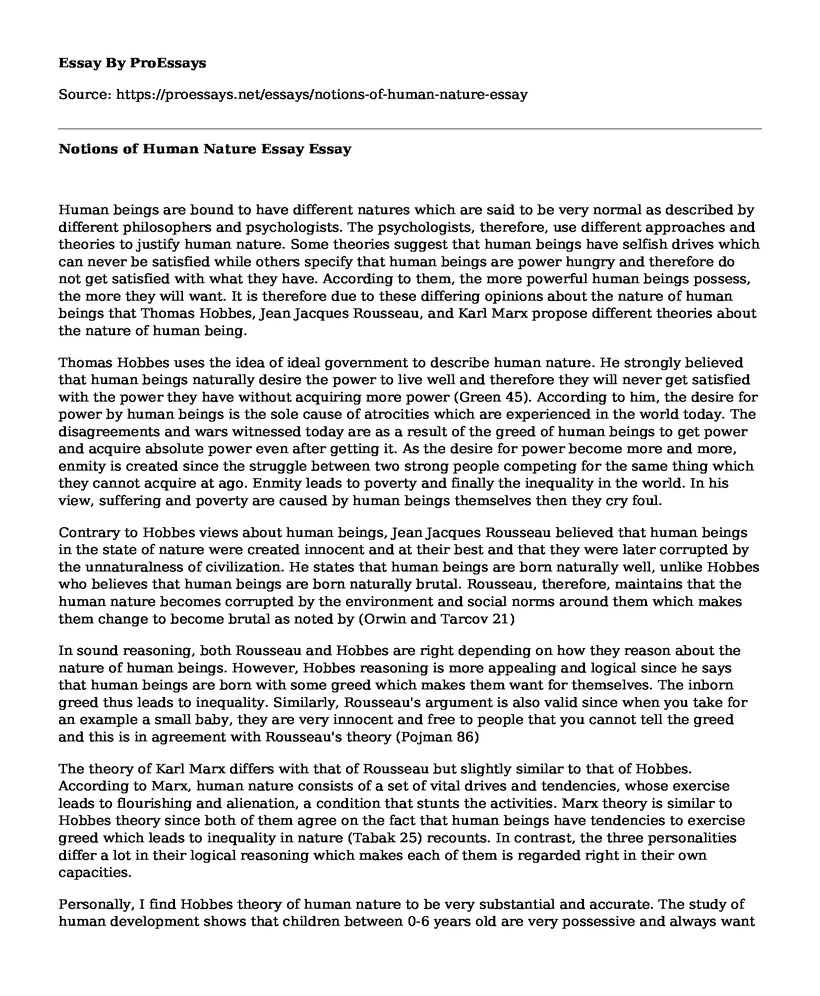Human beings are bound to have different natures which are said to be very normal as described by different philosophers and psychologists. The psychologists, therefore, use different approaches and theories to justify human nature. Some theories suggest that human beings have selfish drives which can never be satisfied while others specify that human beings are power hungry and therefore do not get satisfied with what they have. According to them, the more powerful human beings possess, the more they will want. It is therefore due to these differing opinions about the nature of human beings that Thomas Hobbes, Jean Jacques Rousseau, and Karl Marx propose different theories about the nature of human being.
Thomas Hobbes uses the idea of ideal government to describe human nature. He strongly believed that human beings naturally desire the power to live well and therefore they will never get satisfied with the power they have without acquiring more power (Green 45). According to him, the desire for power by human beings is the sole cause of atrocities which are experienced in the world today. The disagreements and wars witnessed today are as a result of the greed of human beings to get power and acquire absolute power even after getting it. As the desire for power become more and more, enmity is created since the struggle between two strong people competing for the same thing which they cannot acquire at ago. Enmity leads to poverty and finally the inequality in the world. In his view, suffering and poverty are caused by human beings themselves then they cry foul.
Contrary to Hobbes views about human beings, Jean Jacques Rousseau believed that human beings in the state of nature were created innocent and at their best and that they were later corrupted by the unnaturalness of civilization. He states that human beings are born naturally well, unlike Hobbes who believes that human beings are born naturally brutal. Rousseau, therefore, maintains that the human nature becomes corrupted by the environment and social norms around them which makes them change to become brutal as noted by (Orwin and Tarcov 21)
In sound reasoning, both Rousseau and Hobbes are right depending on how they reason about the nature of human beings. However, Hobbes reasoning is more appealing and logical since he says that human beings are born with some greed which makes them want for themselves. The inborn greed thus leads to inequality. Similarly, Rousseau's argument is also valid since when you take for an example a small baby, they are very innocent and free to people that you cannot tell the greed and this is in agreement with Rousseau's theory (Pojman 86)
The theory of Karl Marx differs with that of Rousseau but slightly similar to that of Hobbes. According to Marx, human nature consists of a set of vital drives and tendencies, whose exercise leads to flourishing and alienation, a condition that stunts the activities. Marx theory is similar to Hobbes theory since both of them agree on the fact that human beings have tendencies to exercise greed which leads to inequality in nature (Tabak 25) recounts. In contrast, the three personalities differ a lot in their logical reasoning which makes each of them is regarded right in their own capacities.
Personally, I find Hobbes theory of human nature to be very substantial and accurate. The study of human development shows that children between 0-6 years old are very possessive and always want to own everything for themselves. This confirms that they are born with greed which manifests at this early age and intensifies as they become adults.
Works Cited
Green, Arnold W. Hobbes and Human Nature. Transaction Publishers, 1993.
Orwin, Clifford, and Nathan Tarcov. The Legacy of Rousseau. U of Chicago P, 1997.
Pojman, Louis P. Who Are We?: Theories of Human Nature. Oxford UP, 2006.
Tabak, Mehmet. Dialectics of Human Nature in Marx's Philosophy. Palgrave Macmillan, 2012.
Cite this page
Notions of Human Nature Essay. (2022, Mar 03). Retrieved from https://proessays.net/essays/notions-of-human-nature-essay
If you are the original author of this essay and no longer wish to have it published on the ProEssays website, please click below to request its removal:
- Course Work Sample - Dialogue Paper: Plato and Skinner
- Paper Example on Utilitarianism
- Counselling Paper Example
- Tesla Ethics and Social Responsibilities Essay Example
- Reaction to the American Dystopian Dream - Essay Sample
- Family Role Model Personal Essay Example
- Essay Sample on Exploring the Impact of Social Standards on My Identity







